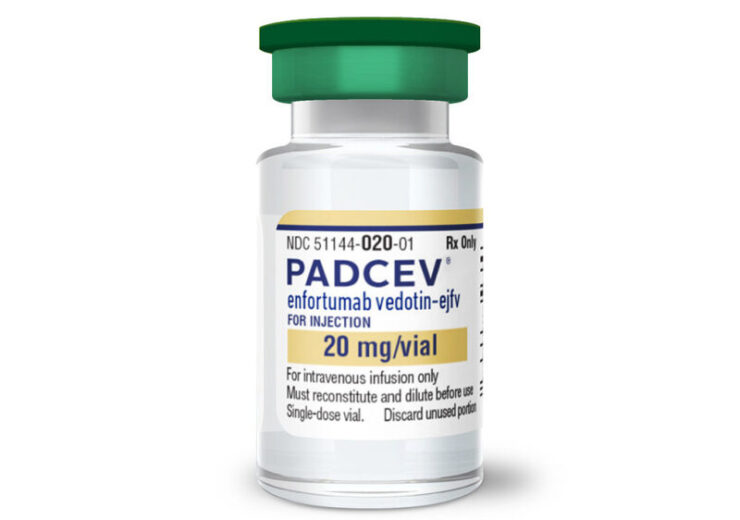The approval was based on findings from cohorts A and K of the EV-103 phase 1b/2 trial in which the ORR was reported at 68% and CRR was 12% with the combination therapy

PADCEV, KEYTRUDA combo gets FDA accelerated approval for urothelial cancer. (Credit: Astellas Pharma US, Inc.)
Astellas Pharma and Seagen have been granted accelerated approval for their jointly developed PADCEV (enfortumab vedotin-ejfv) in combination with Merck’s KEYTRUDA (pembrolizumab) from the US Food and Drug Administration (FDA) as first-line treatment for urothelial cancer.
The accelerated approval is for adult patients whose condition is locally advanced or metastatic and are ineligible for cisplatin-containing chemotherapy.
PADCEV is an antibody-drug conjugate (ADC) that targets Nectin-4, a protein situated on the surface of cells and expressed highly in bladder cancer.
KEYTRUDA is an anti-programmed death receptor-1 (PD-1) therapy that boosts the ability of the immune system to find and fight tumour cells.
Seagen CEO David Epstein said: “Advanced-stage urothelial cancer is aggressive and associated with devastating outcomes.
“In the EV-103 clinical trial, the use of PADCEV in combination with pembrolizumab resulted in confirmed and durable tumor responses in over two-thirds of patients with advanced bladder cancer. Global enrollment in the confirmatory trial, EV-302, is complete.”
The FDA’s accelerated approval was based on findings from cohorts A and K of the EV-103 phase 1b/2 trial.
In the trial, 121 patients were given PADCEV in combination with KEYTRUDA. The objective response rate (ORR) was 68% in the investigational arm.
The complete response rate was 12% while 55% of patients experienced a partial response in the PADCEV, KEYTRUDA arm.
Merck Research Laboratories SVP and chief medical officer Eliav Barr said: “This approval is a major milestone in the treatment of patients with locally advanced or metastatic urothelial carcinoma because it is the first approved combination of an immunotherapy and an antibody-drug conjugate for these patients.
“This expands the use of KEYTRUDA-based regimens to more patients with advanced urothelial carcinoma and demonstrates the value of collaboration in creating new combination approaches for patients in need of more options.”
In February 2020, the combination therapy was granted breakthrough therapy designation by the FDA. In December 2022, it was granted priority review by the US regulator.
The ongoing EV-302 phase 3 trial is assessing the clinical utility of the combination therapy in patients with previously untreated advanced urothelial cancer. It will serve as the confirmatory trial for the FDA accelerated approval.
